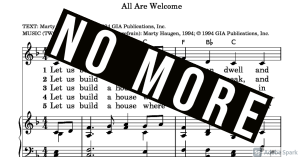For those who have been to many a Catholic parish, the notorious hymn “All Are Welcome” may play. This hymn, while well-meaning in the general sense, causes many problems because in truth, not all people are welcomed into Heaven because of choices. The sinner is welcome to be forgiven if he wants it and to change, but sin is not welcome, and those who do not care or would destroy are not welcome because of obvious reasons, lest they choose to change, and for such reasons, all are NOT welcome.
After many years, and in a positive move, the USCCB has declared that certain hymns, because of their ‘questionable’ nature and lyrics are being declared ‘unwelcome’, of which “All Are Welcome” is one of those song.
The doctrine committee of the US bishops’ conference (USCCB) earlier this year produced a guide to evaluating the lyrics of hymns on the basis of their doctrinal content, noting that Vatican II declared sacred music’s purpose to be “the glory of God and the sanctification of the faithful.”
“Christian tradition, both Eastern and Western, has from antiquity been acutely aware that hymns and other songs are among the most significant forces in shaping – or misshaping – the religious and theological sensibility of the faithful,” the committee wrote in “Catholic Hymnody at the Service of the Church,” which is dated September 2020.
“It is all the more important, then, that hymnody selected for the liturgical life of the Church successfully draw out the beauty of the Christian mysteries themselves. This cannot be done if language is used that is out of keeping with the sensibility created by scriptural texts and universal liturgical usage.”
The document was distributed to bishops this month; they were encouraged by the USCCB to share it with diocesan worship offices, pastors, and parish musicians.
The U.S. bishops’ doctrine committee provided two general guidelines for determining whether a hymn is doctrinally suitable for liturgical use: whether it conforms to Catholic doctrine, and whether its images and vocabulary appropriately reflect the usage of Scripture and the liturgical prayer of the Church.
While hymns needn’t “be composed of doctrinal formulae … It is important to avoid language that could be easily misconstrued in a way that is contrary to Catholic doctrine,” the bishops explained.
…
Examples of hymns that offend the presentation of Eucharistic doctrine, they said, include “God is Here! As We His People”; “Now in This Banquet”; “Let Us Break Bread Together on Our Knees”; and “All Are Welcome”.
As alternatives, they offered “Ave Verum Corpus”, “Taste and See”, “You Satisfy the Hungry Heart”, “Seed Scattered and Sown”, “I am the Bread of Life, “One Bread One Body”, “Eat This Bread”, “Look Beyond”, “At That First Eucharist”, “O Sacrament Most Holy”, “O Salutaris Hostia”, “Adoro Te Devote”, and “At the Lamb’s High Feast”. (source)
Note instead the replacement songs. Some are contemporary, but many are traditional.
This is a great blessing, and a hopeful sign of a positive trend for the future.
There are a lot of problems in the Church, and one of them has been orthodoxy. There are a lot of people with well-meaning but bad ideas. They have not been dealt with, and the bishops have been very slow to deal with them.
It is a miracle that somebody in the USCCB actually said something about these songs. This is very rare, and a hopeful sign that some people are realizing the need for change.
There is much work to be done. One song really means very little. However, it is also major because major things always come from tiny beginnings no matter what the trend in question may be.
With Christianity being generally resisted or rejected by American society, the churches are going to consolidate and will have to be more serious if they want to survive. There can be no more “all are welcome” but rather, those who care about God are welcome, and they should persevere until the end and through hard times as well as the good ones. This is the general message that is coming and those who are Christians will have to take note of if they want to survive.
So for the future, watch for a trend of increasing orthodoxy in the churches especially in the US and Catholic Church. Likewise, this also will come at the same time of many people becoming or pushing for looser policies and perhaps leaving religions completely. This is going to be expected as a trend, but will ultimately end with persecution but having a strong core for the Church that can withstand serious attacks from the culture and, just as Christ promised to St. Peter, that as She is the Church built by Christ on the Rock of Peter, may have the gates of hell themselves enter into Her but will not prevail over her. This is a great mystery, a great miracle, and has been proven by history over and over and will remain until Our Lord returns at last.



